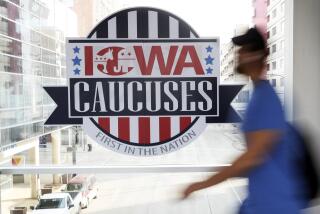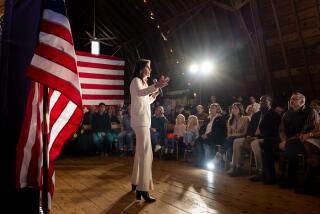Behind, With Time Running Out, Bradley Goes on Attack
- Share via
DES MOINES — Scrambling across Iowa’s frosted farmlands in the dwindling days before the caucuses, Bill Bradley is trying to close Al Gore’s sizable lead here by punching up his usual stump speech with aggressive jabs at his opponent.
Throughout his candidacy, Bradley has proclaimed his bid for the presidency “a different kind of campaign” that would focus solely on policy. But now, his new tactic is raising nagging contradictions that seem to muddy his above-the-fray image.
Earlier this week, Bradley dismissed a question posed by Gore about his record as an issue of the past, then called a news conference days later questioning Gore’s record.
On Thursday, in comments published in the Boston Herald, Bradley chastised Gore for introducing the racially divisive issue of Willie Horton during his 1988 presidential campaign against then-Gov. Michael S. Dukakis of Massachusetts. Then-Vice President George Bush later used the image of Horton, an African American prisoner who committed rape while on weekend furlough, to hammer Dukakis.
And after months of vowing not to run a negative campaign, the former New Jersey senator’s language about his opponent has become more caustic, as he accused Gore of failing to help farmers or fight tobacco hard enough.
“This is a critical moment in the campaign,” said Democratic consultant Jim Margolis, who is neutral in the race. “With this strategy, Bradley does put at risk the whole ‘I’m not a typical politician’ [image].
“However, he also risks in not engaging, in not being viable in the primaries and caucuses that are coming. This is a moment where he probably needs to make sure he’s not just taking the heat but raising the fundamental issues that are different between him and the vice president.”
Offensive Shows What’s at Stake
Bradley’s stepped-up offensive reinforces how high the stakes are in the coming days. He has 10 days to play catch-up with Gore and demonstrate a strong showing when Iowans select their party candidates at the Jan. 24 caucuses, the first major test of the presidential candidates’ mettle.
Polls show Bradley running neck-and-neck with Gore in New Hampshire, where the first primaries will be held Feb. 1. But he could jeopardize his standing if he has a poor showing in Iowa.
Many political analysts say Bradley must garner at least 40% of the vote to get a strong bounce out of Iowa. But in a poll last weekend published by the Des Moines Register, Gore was ahead, 54% to 33%, with 13% of the voters still undecided.
Anita Dunn, Bradley’s communications director, said that his intensified criticism of Gore does not undercut Bradley’s vow to be a different kind of politician.
“Sen. Bradley has said from the beginning that there would be a time when the differences between them would be laid out,” she said. “We’re not running a negative, gimmicky campaign. But because there are differences in leadership, we feel it’s appropriate to point them out.”
The former professional basketball player has launched what he terms “a full-court press” in Iowa, flooding television with $1.4 million worth of ads and mobilizing hundreds of volunteers to organize voters for caucus night.
But the real work is happening on long bus rides through places like Exira and Boone in southwestern Iowa, where Bradley traveled this week, rolling past fallow cornfields flecked with snow and pockets of new tract housing, resolutely pushing his message in cafes, cattle auctions and community centers.
Quoting Thomas Jefferson, author D.H. Lawrence and Jewish sage Rabbi Hillel, Bradley repeated his call for “bold leadership” on issues like health care, campaign finance reform and gun control.
“Do you believe at this time of unprecedented prosperity we can do something big to deal with big problems, or do you want to continue to nibble around the edges?” he asked crowds.
Along the way, Bradley injected his usually optimistic stump speech with strident words about Gore, accusing the vice president of having a mixed record on tobacco, criticizing him for spending more money on defense than education and questioning the current administration’s dedication to family farmers.
“There is no credibility for Al Gore to come to Iowa and say, ‘I’ll help family farmers,’ because in the last seven years, there’s been no help from this administration for farmers,” Bradley told audiences.
By ratcheting up his attacks, Bradley is trying to recover from what many analysts said was a lackluster performance during a Des Moines debate Jan. 8, when he refused to answer Gore’s queries about why he voted against flood relief for Midwestern farmers in 1993. Since then, Bradley has said he voted for a general disaster relief bill that helped victims but opposed the amendment Gore cited because he felt the money was not targeted to farmers.
But in his attempt to recover, Bradley seems to have undercut his insistence that the campaign should be about the candidates’ vision for the future. On Tuesday, he held a news conference and tried to cast Gore as having a mixed record on tobacco, pointing to a 15-year-old vote Gore made in the Senate.
Gore decried his comments as “desperate, negative campaigning.”
But Thursday, Steve Hildebrand, who is directing Gore’s Iowa campaign, said Bradley’s new strategy has caught their attention.
“Any time he can come up with any kind of effort that undermines our ability to get our message through, particularly on leadership, he’s going to make some headway,” he said. “He’s been touring all over farm country saying the same thing: Clinton/Gore did nothing for agriculture.”
Gore Spotlights Family Farmers
On Thursday, Gore tried to showcase his commitment to family farmers during a visit to the 2,100-acre farm outside Sloan, Iowa, where Jon Roarson grows corn and soybeans--but killed his hogs last summer because the cost of raising them was more than he would be paid by a slaughterhouse.
“We’re spending more money on subsidies and more people are going broke,” said Gore, standing in a frigid metal-sided barn. “We need to recognize that family farming is facing a deadly threat.”
Out on the road this week, Bradley still drew passionate crowds that appeared taken with his reputation as a sincere candidate pushing a message of hope.
“If he could present his vision to the rest of the country the way he did tonight, that trust, that honesty would come out to everyone,” said farmer Don Adams, 48, after hearing him speak at Boone Community College. “He just instills confidence.”
Added his wife, Nan Bonfils, 49: “There’s boldness about him that’s appealing to me. There’s no flashy razzle and dazzle but a sense that, ‘If you put me in the White House, I’m not going to waste your time.’ ”
But the challenge for the Bradley campaign is to translate that kind of enthusiasm into support at the caucuses, a time-consuming event during which Iowans can spend several hours debating and discussing their picks for president. When a Bradley volunteer handed Adams and Bonfils cards to sign up for caucus night, they didn’t fill them out but instead promised “to hold on to them.”
Despite the mounting pressure, Bradley, in many ways, has grown increasingly relaxed on the campaign trail, exhibiting a quirky sense of humor, especially at night, when his internal clock seems geared to “game time,” a vestige of his basketball career.
During a late stop at an American Legion hall in Des Moines last weekend, a cheerful Bradley spent almost an hour going up and down 12 long tables in the smoke-filled room, shaking hands and chatting. At one, he drank from a pitcher of beer. At another, he grabbed a woman and started dancing to “Unchained Melody.” The audience roared with laughter and applauded. As he left, he blew a kiss goodbye.
Sometimes, though, the import of the last days before the caucus seems to sink in.
“This is where it all starts,” he mused to a group of 100 supporters at Boone Community College Monday night, after spending an hour explaining his position on issues like gun control, farm policy and education.
After the caucuses, he said, “they’ll talk about who’s up, who’s down. They won’t talk about the things I talked about today. They’ll talk about winners and losers.”
*
Times staff writer James Gerstenzang contributed to this story.
More to Read
Get the L.A. Times Politics newsletter
Deeply reported insights into legislation, politics and policy from Sacramento, Washington and beyond. In your inbox twice per week.
You may occasionally receive promotional content from the Los Angeles Times.










